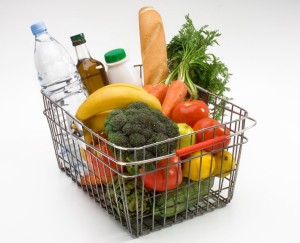 It’s a new year and one of your resolutions is how to save money. One of the easiest ways would be at the grocery store. I know I am guilty of just going and throwing something in the cart because I want to try it, or the packaging looks nice. Here are some economical ways to cut down on your bill and maybe on your waist.
It’s a new year and one of your resolutions is how to save money. One of the easiest ways would be at the grocery store. I know I am guilty of just going and throwing something in the cart because I want to try it, or the packaging looks nice. Here are some economical ways to cut down on your bill and maybe on your waist.
Don’t shop on an empty stomach: I did this yesterday and what a mistake I made. I came home and there were chips and ice cream, things that I never usually buy. Do yourself a favor, have an apple or a handful of nuts before hitting the aisles.
Plan! Make a list before you leave the house. If you are very organized (or have the patience) make a menu for the week. This will save you time, energy and last minute take out calories. If you have a menu and a list, this also eliminates last minute trips to the store for say, fresh thyme or basil.
Buy generic: Debunk that myth that store brands are bad! Even though it is by a brand you might not know, all generic products have to go through the same quality tests that the name brands do. I was once held hostage to this myth myself, but have found that at times to save a buck or two generic is the way to go and in the end, the savings can add up.
Shop alone: When you are solo, you have more focus and cant be side tracked. Leave the kids at home if you can, this way you wont find sugary and expensive cereals in your cart.
Make smart substitutions: This might not be easy for everyone, but think about what you eat, and then think about what may be a cheaper—at equally healthy—substitute. Like breakfast cereal? Oatmeal is usually cheaper. Love soda? Try sparkling water with a little fruit juice mixed in. Snack on chips? Pop some popcorn kernels on your stovetop instead. Be willing to make substitutions on brands and specific ingredients based on sales, too. You may find that a different brand or flavor of yogurt, for example, is a better deal one week. Snag it!
Buy whole foods: Sometimes, the less processed a food is, the cheaper it is per serving. Apples may cost less than applesauce or apple juice. Canned black beans will be cheaper than refried beans. Think about the original, whole food that a product is made from and decide if you can eat that whole food as-is or use it to make your own sauce, cereal or juice—instead of paying food manufacturers to do it for you.
Buy in bulk: Long a staple of natural food stores, bulk or “bag and weigh” sections are now appearing in traditional supermarkets. Items like flour, beans, rice, nuts, and dried fruits are available for less than prepackaged versions of the same foods.
Don’t get stuck in the middle (of the grocery store): Packaged foods have been condensed, salted, refined, sweetened, or otherwise processed. They may seem like a good deal, providing more calories for less money, but those calories usually aren’t very nutritious. Resist the lure of the middle aisles and stick to the perimeter of the grocery store; you’ll save money and wind up with bags full of whole foods. When you do find yourself in the middle aisles, aim your gaze toward the top or bottom of the shelves, where the prices are usually lower. Grocers strategically place higher-priced products at eye level.
Read ads and clip coupons: A “loss leader” is a sale item that a store is actually selling at a loss in order to get you in the door. Take advantage of these deals when you see them, but remember, a good deal is only good if it’s on something you’d normally buy, not just something you’re buying because it’s on sale. Many sales and coupons are on less-than-healthy processed foods, so look for special deals on healthy items like yogurt, canned or frozen fruits and vegetables, and similar staples that have a longer shelf life.
DIY: If you’re really craving a special treat, make it from scratch. You can make it from healthier ingredients and spend less.
Eat seasonally. In-season produce costs less, thanks to the law of supply and demand. You might miss having tomatoes in the heart of winter, but the fresh, perfect tomatoes of summer taste better, cost less and are more nutritious anyway. Make a trip to your local farmers market to get some great prices on local produce.
Carry out—from your kitchen: Packing your lunch, snacks, drinks, and other meals are usually less expensive and healthier than eating out. It will require more planning, but the dollars you save will be worth your time in the end. If necessary, invest in some reusable lunch bags and containers instead of buying disposable sacks and baggies for your food week after week.
Grow your own food: Plants are cheap, and seeds are even cheaper. You can grow your own fruits and vegetables right in your very own backyard (or in containers on your balcony) with a minimal amount of effort. They’ll save you money and taste far better than store-bought. If you’d like some instant gratification.
-Jessica Brown

















